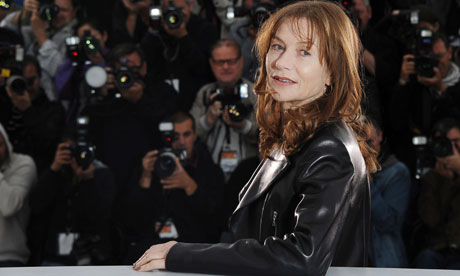
You're the queen of Cannes – you've been master of ceremonies, been on the jury and been its president, have won best actress twice and have two films here this year, Michael Haneke's Amour and Hong Sang-soo's In Another Country…
I am happy here and it means a lot to me. I used to find it difficult, the red carpet, the interviews, but I know the routine and the ritual now very well, so I've grown to like it. Also there's such respect for the movies here, for the directors and the actors, that you feel a heat, a compassion when you go up the steps, like something's really beginning. It can be upsetting if afterwards they don't like your film, but actually it's still very interesting to see how many different opinions there are. You make films in such isolation that when they get to Cannes you really see another perspective on the work you've done. I find it refreshing and inspiring.
You didn't mind the rain this year? Both of your red carpet appearances were the soggiest in anyone's memory, at least for 20 years.
But I liked that too. It puts you on your toes, even if they are wet toes. I don't care that my hair and dress got wet and were flying all over the place. I think it makes a nice change and invigorates you to do something different within this ritual. The whole mise-en-scene gets shifted and everyone gets a bit clumsy. I liked it.
In Another Country is a playful film, experimental and comic in tone and really quite strange. Tell me about making it in Korea…
I play three parts and through these three little stories we see a woman's whole emotional life – desire, expectation, loneliness, love, disappointment. It looks a simple film but it's really about a lot of things. I had a lot of fun making it and it was in a lovely part of Korea, by the sea, but it was also hard work. I know it looks free and easy, but it wasn't improvised at all. Hong Sang-soo writes his dialogue every night and gives you the script every morning and you shoot it. The film looks spontaneous but it's very precise actually.
You speak goat at one point…
It's true, the character was lonely and needed to speak to someone so she speaks to the goats, making goat sounds. I've never done that before, certainly, but that's why you keep doing movies, to do things you've never been asked to do.
Is that what you look for in a new script?
Not always. Sometimes you want to repeat things you've already done. That can be just as much of a challenge and just as fulfilling, to feel you're getting better at it.
You've worked with Michael Haneke several times before, so is being in Amour, playing the daughter of Jean-Louis Trintignant and Emmanuelle Riva, part of that process – working on familiar territory?
I did certainly want to work with Michael again, like a shot. My character isn't the major figure, but she is very important, bringing a new rhythm to the film. She ushers in a sense of life to this apartment when death and disease is closed up in it. It's a very true film. It feels very real to me. I suppose we're all father or mother, daughter or son at some point, so it's something that touches everyone as a subject, but it's really the honesty of how it is treated that makes this very special.
Although you've made nearly 100 films, you do manage to do a lot of work on stage in Paris. Have you ever thought about Broadway?
I don't think Broadway is quite right for me. I've just done A Streetcar Named Desire in Paris on the stage and we're taking that on tour to the Brooklyn Academy of Music (BAM), which is much more my home than Broadway.
Might you put that performance on film? Blanche is as iconic a role as Madame Bovary, which you did for Chabrol…
I don't think I'd do Blanche on film, at least not this production. It's an iconic role in French theatre as much as English, because Tennessee Williams is wonderful in French too. His themes appeal all over the world.
Can you do the southern accent in French?
Not exactly, although of course I know it's a role famous for that, and I love Vivien Leigh in the film. But you change it and convey the mental geography of the character instead, not the physical, actual geography of where it's set. Blanche is a continent in herself, and I know the location is a key element but this time we tried to make it more universal. It's a very conceptual production. Actually, the role of Stanley Kowalski was played by a Polish actor, so he did bring a foreign accent to the French text, which added a lovely shade to the piece.
You did Heaven's Gate in Hollywood a long time ago, and more recently I Heart Huckabees – both films notorious in their own way, not huge successes but they do have their cult admirers. Will you do another Hollywood film?
I am right now filming Dead Man Down in Philadelphia. I have to go back there after Cannes. It's my first Hollywood picture for many years. It's with the director of the Swedish version of The Girl With the Dragon Tattoo, Niels Arden Oplev. It's funny because it's a very European film for Hollywood – the director is Danish, and in the cast there's Noomi Rapace who's half Swedish-half Spanish, Colin Farrell is Irish, Dominic Cooper is British and there's me, who is French. Terrence Howard is almost the only American in it, so we all laugh about that. I'm enjoying it very much, so maybe we'll see for the future.

